Iris Ruth Pastor's Blog, page 5
February 14, 2025
How to Fully Enjoy Valentine’s Day
A few years ago, I passed out a survey to a cluster of couples of varying ages whom I considered to have a “solid, well-functioning” relationship.
(Is there even such a thing? Hee hee!)
Primarily I asked them what irritated and/or annoyed them most about their mates or partners.
Here’s a sample of their responses:
HUSBANDS ABOUT WIVES:
Leaves the garbage on the porch for the garbage fairy (me) to lug to the curb
Never puts the driver’s seat back in position so I can get in the car without banging my knees
Worries too much about everything and anything
Never hangs up her clothes and then yells at me for the same thing
Carries on a conversation and in the middle of it, changes the subject and expects me to follow
Has to let me know every detail of her job whether I want to know or not
Wears the ugliest housecoat around the house
Talks too much and drives too fast
Makes me her gopher – go for this, go for that
Buys too many pairs of shoes – how many does she really need?
Keeps every drawer in a state of unorganized messiness – actually our whole house is
Throws stuff all over the place and loses things all the time
Puts off for days making phone calls for me
Tries to micro-manage our son’s life and works too much
Wants to talk on the phone too much
Wears way too much gold jewelry and can’t handle money
WIVES ABOUT HUSANDS:
Mumbles inaudibly and he’s moody
In the middle of the night, furiously cleans his ears with his index finger while he is still asleep – the noise is like a jack hammer
Believes that now that he has a wife, he has acquired the right to become a slob
Can’t do two things at once
Is ozone – never listens to anything I say
When he’ s wrong, he doesn’t apologize
Doesn’t allow me to do anything creative because he needs my undivided attention when he’s home
Gets up early before anyone else, goes into the kitchen to play his guitar and taps his foot on the floor – loudly
Coughs without putting his hand over his mouth
Eats the ice cream from the container
Drives too slowly and never knows where he is going
Drives too fast and never knows where he is going
Thinking that anything that falls on the floor has to be washed or thrown away – by me
Clears his throat all the time
Does the laundry but doesn’t fold it so everything gets wrinkled
Never hears the kids in the middle of the night
Never pulls into the most obvious (and closest) parking spot
Accelerates to get to red lights
When I ask my husband what irritates or annoys him about me, he says: “Nothing. You’re perfect.” That annoys me.
My favorite response: “I feel my husband is like fine wine – he starts out like grapes and it’s my job to stomp on him and keep him in the dark until he matures into something with whom I’d like to have dinner.”
Why am I printing these now – on the most romantic holiday of the year?
I’m listing them to remind all of us that perfect romantic relationships are an unattainable goal and that having pet peeves in regard to our loved one’s habits are universal.
Tuck those tidbits of irritation away and focus on the glorious reasons why you fell in love in the first place.
Happy Valentine’s Day and Keep Preserving Your Bloom,

February 7, 2025
The Danger of Too High Expectations
This week a close friend of mine sent me the following quote:
Happiness equals success over expectations
I couldn’t agree more.
Discontent is fed by our unmet expectations for others.
I have them.
And a lot of my friends have them too.
Mainly these unmet expectations are over our children –
their choices,
their priorities,
their values
and the way they lead their lives.
For the purpose of confidentiality and wanting to maintain the wonderful friendships I am privileged to have and without risking the wrath of my sons, I will not iterate on this specific topic. Trust me on this fact: a lot of real estate in our heads is taken up with wishing, hoping, praying and obsessively ruminating about the vast difference in what we expect and what we get.
So how do we manage our unmet, high and often dashed expectations?
We manage by lowering our expectations in general. When we set them too high, the likelihood of failing increases. We then experience disappointment and frustration.
For instance, many of us with grandkids out of town would like to see them way more frequently than we do. If we have realistic expectations, we can up our chances of enjoying those lovely little ones vastly more than if we are seething with bottled up negativity.
When we consider others’ perspectives, it is also much easier to keep our expectations realistic. My sons have repeatedly cited my lack of taking THEIR perspective into active consideration heightens my stress and anxiety – which, of course, can have a major negative impact on my mental and physical health. DUH!
And, of course, too high expectations can spill into other areas too.
For the last 30 months I have been acquiring used jean jackets with the idea of upcycling them after I embellish them. I am hoping to sell them for a profit. But in the early morning hours, I am often
jolted awake by ripples of fears centered on failure – thinking I may have way too high expectations for how much I can accomplish without driving myself nuts in the process.
My high expectations for success may be actually negatively impacting my ability to pursue fully this new opportunity. It so easy to tumble down a dark hole – experiencing a decrease in motivation and an uptick in stagnation and apathy when I feel I can’t live up to my own hype.
And then there is the realm of relationships and how easily they can be damaged by someone else’s too high expectations for us. Who amongst us at some point hasn’t felt pressure to be all things to a person close to us who was going through an emotionally wrenching time?
Due to a friend’s high expectations, we can feel forced to overperform and that can seamlessly lead into a negative self-image. Feeling that we can’t live up to that idealized version of ourselves as a true and loyal friend leads us to begin to question our own self-worth.
It’s not easy to overcome rigidly high expectations – our own and others. But if we find ourselves regularly feeling angry, let down or put upon by those in our inner circle, it may be time to examine those expectations.
There is hope.
Let’s try introducing flexibility into the parameters we set for ourselves and others.
Let’s try being more open-minded.
Let’s not over personalize.
Let’s seek to understand.
Let’s practice compassion.
Let’s embrace situations realistically, not idyllically.
Let’s recognize that looking at other’s perspectives can help us figure out a comfortable point for our own expectations.
These actions will prevent overall burn-out and promote healthier outcomes for us all.
Keep Preserving Your Bloom,

January 31, 2025
I’m Not Crazy About Valentine’s Day
I’m not crazy about Valentine’s Day.
I’m not crazy about Mother’s Day either – or any day that singles out an emotion like romantic love and/or parenting prowess.
If my family’s response to these two holidays doesn’t meet my expectations, I get depressed.
Then I get angry.
Then I start questioning whether I am I a great
mother or partner
or even an adequate partner or mother.
Then I start going down the list of all the things that I THINK make me a great partner and a great mother. And I get frazzled to think that maybe my husband and sons simply don’t recognize my innate worth centered around these two pivotal roles. 
Lack of acknowledgement in the rigid way I yearn to be acknowledged does me in every time.
I’m doing some pivotal and interventional maneuvers when it comes to this Valentine’s Day so this totally self-destructive cycle does not repeat itself again.
A few years back, my husband and I went out to a very cool local place that has a great coffee bar and tea bar surrounded by lovely and serene gardens. We pretended we were just meeting for the first time. And we carried this charade along when we dealt with the waitress too.
What did this mean?
Well, if we were meeting for the first time, I obviously couldn’t get irritated with him right off the bat when he announced to me that he had forgotten to bring his reading glasses – leaving him unable to decipher the menu – which meant I would need to literally read him the selections.
What else did it mean? If we were meeting for the first time, I couldn’t abruptly ask him to change the subject when he kept focusing on the book he was reading about historical events leading up to World War 1 because I wanted the conversation to take a more personal turn.
Soooo on our contrived late afternoon date, what would I need to do? Pull up my big girl pants, turn on the charm while searching in my arsenal of folders in my brain for questions that would yield answers to what kind of person he was and whether I would be interested in having more dates with him.
That’s what I did and here are the questions I came up with:
What ability would you like to have that you don’t?
If you had one year to live, what would you change?
What do you feel is your greatest accomplishment?
What in your life do you feel most grateful for?
If you had a crystal ball, what would you like to know?
What is your favorite thing to do?
What constitutes a perfect day?
What would you plan for a dream date night?
Here’s my suggestion for this upcoming Valentine’s Day:
· Schedule a late afternoon coffee date or wine date or dessert date on Valentine’s Day or one of the days close to it.
· Do what I did with my husband, with your husband, partner or romantic love interest.
The upside is you may learn things about your husband, partner or romantic love interest that you never knew.
The upside is you will have taken some measure of control to assure that Valentine’s Day is as pleasurable as you have always imagined it could be.
Keep Preserving Your Bloom,

January 24, 2025
I Am A Writer…

I could not only buy this sweatshirt, but could wear it daily. And I’d get lots and lots of nods in agreement.
Every time a friend shares a confidence or a slightly off-color joke or a controversial political opinion, they jokingly, but also quite seriously, inquire of me the following:
I’m not going to see this in one of your columns, am I?
“Probably not,” I usually, casually, maddeningly and vaguely reply.
In all honesty, things said to me in confidence are respected mightily by me as “off limits”.
Another “off limits” subject in my weekly column is my absolutely adorable eight grandchildren, ranging in age from 2 years to 18 years.
Why?
Two reasons:
Their parents
and
My readers
Their parents are not wild about me sharing details of their children’s lives – including, but not limited to, their idiosyncrasies, crazy stunts or remarkable achievements.
And I don’t really blame the parents for not being eager to have their privacy invaded.
And I don’t really blame my readers. Most people are only mildly interested in other people’s grandkids’ brilliance and precocity anyway.
Most sane grandparents would agree that their grand -children are adorable and perfect – and the source of never-ending fascination – but they realize this is mostly confined to themselves.
So, little talk of grandkids ‘til now. Experiencing two totally different responses from my sons’ kids to my overtures and actions is making me pause to consider how to cope with this evolving and rather recent state of being.
What grandparent’s heart doesn’t warm when experiencing the devotion of their five-year-old grandchild?
And is there nothing more demoralizing to a grandparent when that simply magical five-year-old grows into an indifferent teenager?
I’m trying to deal with these dramatic changes so that I can enjoy each phase and each age of my grandkids’ lives.
My five-year-old granddaughter recently related to her babysitter that I am her most favorite person in the whole world!
I doubt greatly my teenage grandkids would even rate me in their top 10 list of most favorite people.
Those lovelies don’t jump in my husband’s and my bed at 6:30 each morning when they visit, cuddling close and smothering us with their cold feet and warm little fingers.
Our teenage grandkids don’t cry when they leave us, as does the two-year-old or hug us for absolutely no reason at 2 pm in the afternoon as does the seven- year-old.
We may get enthusiastic hellos – but too often the greetings are immediately followed by their deep dives into their computer screens or phones. Sometimes we even get a hug as they fly out the door to meet their friends – or a particular “friend.”
And yet, sometimes they surprise us with a late-night confidential text, a timely phone call about a college acceptance, a compliment out of nowhere or a favorable well-thought-out observation on our family’s functioning.
Our teenage grandchildren are slowly morphing into the adults they will someday become – expressing curiosity about our family history, questioning who we vote for and why we do.
And by their choice of friends to hang-out with, hobbies to pursue and school subjects they embrace, we see glimpses of the adults that in later years they will become.
What have I learned after being blessed with grandchildren – three boys and five girls?That my sons and their wives make great parenting teams.And to value each passing phase – whether it draws us closer – or drives them further into a world where I will not shine quite as brightly as I once did.No matter – I feel that the ties that bind are still there and that all of the snuggling and focused attention was not in vain.
So, I will glory in their successes,
hope their challenges are minimal,
love them unconditionally
and watch from the sidelines as they find their way in the world.
And I will continue to hope that my husband’s and my presence and the memories we have made with them along the way will always be considered by each of them as one of life’s blessings.
Keep Preserving Your Bloom,

January 17, 2025
My Little Brother
And in the Tampa Bay Area? We are still dealing with the brutal aftermath of two back-to-back hurricanes – Helene and Milton in late September and early October. Those of us who live there all know people whose homes have been damaged and their lives disrupted.
Professionally, my younger brother has managed greater than 40 presidentially decreed disaster assistance programs and he is a recognized expert on contamination issues.
Personally, my younger brother‘s first floor condo – across from the beach – has been uninhabitable due to a couple of inches of contaminated sea water inundating his floors and walls during the last hurricane. This led to mold issues which needed to be remediated and have affected his plumbing, cabinets, and electrical mechanicals. He’s hoping to move back into his unit this summer.
“There’s a big difference between managing a program and being a victim,” he related to me one day early in his residency with my husband and me in our home. “When I managed a disaster – especially when in my 20’s and 30’s – it was challenging, rewarding and sometimes even fun. You look at things differently as you age and mature. As a victim, it is extremely frustrating, sad and seemingly a never-ending saga in the quest for normalcy.”
My brother Steve evacuated and left the state before Milton hit. He came home to find he had lost most of his clothes, every area rug, his only sofa, end tables, bookcases, computer and car.
“Navigating through the federal, state and local assistance agencies is de-humanizing. Dealing with computers and not people is difficult. And getting contradictory information from different agencies is infuriating – not to mention the long delays involved in obtaining permitting for repairs,” Steve tells me.
My brother is 73 years old and comfortably retired. Prior to his beach living, he led a “nomad” existence – not encumbered by a huge inventory of things or overly tied to one geographic location. He partially credits that to his more pragmatic adjustment to his newly altered circumstances.
He will need his pragmatism. It could easily be a full year before he moves back into his condo.
Here’s Steve’s picture where he is bookended between my sister and me
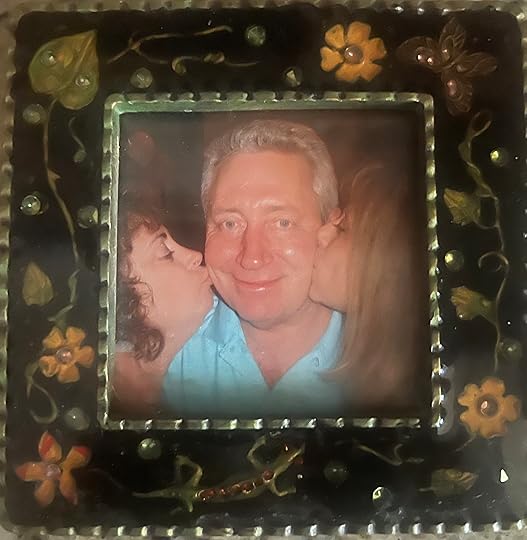
Here’s Steve’s tips for COPING:Try to keep your basic routine in place to provide structure.He used to walk to the same café every morning for eggs over medium and coffee and then walk a few miles on the beach. Now living with my husband and me, he drives to a local brunch place and walks our neighborhood later in the day. Your social structure and sense of community will be disrupted. Reach out.My brother goes back to St. Pete Beach weekly to maintain ties and social connections.
Here’s Steve’s tips for DEALING WITH PEOPLE IMPACTED
BY NATURAL DISASTERS:EVACUATE when told to do so.Don’t wade in the water – it’s contaminated. Listen.Listen.Listen.Caution them at first blush TO DO NOTHING. JUST THINK ABOUT IT. THEN DEVISE A BASIC, FLEXIBLE PLAN. THEN BEGIN TO ACT. Here’s Steve’s LESSONS LEARNED: Don’t buy a first floor condo in a designated flood zone.If you already have one, use sandbags before getting the hell out of the state. Here’s Steve’s tips for LIVING WITH ME AND MY HUSBAND:Learn to ignore the domestic disputes of the relatives providing you shelter.Tune-out said relatives’ focused attention on their trivial concerns.
I guess I’m not going to get any sympathy from my brother over not having time this week for a very much needed mani and pedi.
Keep Preserving Your Bloom,

January 10, 2025
My Funeral
I have a confession. This is NOT the year I will be getting my affairs in order – as in updating my will and my preferences concerning my funeral service.
Why? I simply can’t wrap my arms round the fact of my own mortality. Yes. Yes. Even Covid awareness has not YET jumpstarted this process.
January 8, 2025
I have a confession. This IS the year I am beginning to get my affairs in order. Why? Because friends are going into assisted living due to cognitive decline. Friends are dying – some whom are even years younger than me. And I am living my life less efficiently than in the past – related to my short-term memory getting even shorter.And I found out that I have sleep apnea – some aspects which are moderate and some more severe.And I found out that my osteopenia is now osteoporosis – necessitating physical therapy and a change in medication.EEK!
The above revelations are reflected in the growing girth of the entries into the Notes section of my I phone under the listing “MY FUNERAL”.
Here’s a few of my meandering items:
THEME: I love what Alex Van Halen said. “In the effort lies the reward.” I wasn’t always successful in the many things I did, but I ALWAYS TRIED. I’d like this theme incorporated into any remarks.
MUSIC to be played:
“Keep Me In Your Heart For Awhile” by Warren Zevon
Shadows are fallin’ and I’m runnin’ out of breath
Keep me in your heart for a while
If I leave you it doesn’t mean I love you any less
Keep me in your heart for a while
When you get up in the mornin’ and you see that crazy sun
Keep me in your heart for a while
There’s a train leavin’ nightly called “When All is Said and Done”
Keep me in your heart for a while
Keep me in your heart for a while
Keep me in your heart for a while…
“Forever Young” by Bob Dylan
May God bless and keep you always
May your wishes all come true
May you always do for others
And let others do for you
May you build a ladder to the stars
And climb on every rung
May you stay forever young
Forever young, forever young
May you stay forever young
May you grow up to be righteous
May you grow up to be true
May you always know the truth
And see the lights surrounding you
May you always be courageous
Stand upright and be strong
May you stay forever young
Forever young, forever young
May you stay forever young
May your hands always be busy
May your feet always be swift
May you have a strong foundation
When the winds of changes shift
May your heart always be joyful
May your song always be sung
May you stay forever young
Forever young, forever young
POEMS to be read:
“If” by Rudyard Kipling
If you can keep your head when all about you
Are losing their and blaming it on you
If you can trust yourself when all men doubt you,
But make allowance for their doubting too
If you can wait and not be tired by waiting
Or being lied about, don’t deal in lies or being hated, don’t give way to hating
And yet don’t look too good, nor talk too wise…
(This is just part of the poem – I’d like the whole thing read.)
“Splendor In The Grass” by William Wordsworth
Though nothing can bring back the hour
Of splendor in the grass
and glory in the flower
We will grieve not
But rather find
Strength in what remains behind.
All the rest of the details of my funeral are TBD:
The Setting
The Place
The Time
The Date
Hopefully I will have many more years to think about those finer points and fill in the missing details.
Keep Preserving Your Bloom,

January 3, 2025
I Am So Annoying
Here’s why:
I constantly interrupt people
AND
when someone tells me a story, I one-up-them.
Do you know what THE WORST THING is?
I don’t even realize I am doing it!!!!!
Thank goodness for my little sister – whom I can count on to point out my less than stellar qualities. As I age, she is pointing out my flaws with a consistency and rapidity I didn’t think possible. She is keeping me in line, as my ability to filter seems to be less than it used to be.
So, since the New Year has arrived, my mindset is riddled through with big plans for a brand new ME.I will listen with an open mind and a closed mouth no matter how much I am tempted to sputter forth with my “wisdom.”I will willfully resist the temptation to share my similar experience with the speaker, even if my motive is not to boast or outdo someone else’s experience.
I’ve always felt that my one-upmanship is my way of inching closer to a person, letting them know they are not alone – that I can relate to what they are saying.
The problem is that half the time I don’t even wait until the person is done speaking to interrupt and respond. I just speak over them in a louder voice.
For instance, here is an interaction I recently had with a buddy:
“You had one root canal!” I retorted to my friend. “Whoa, I had a root canal, a massive infection invading my system and an extraction – all in one day. You got off easy!”
A little lacking in compassion, would you say? My reply lacked support and awareness of her suffering with a dental issue.
Here’s one more example of my great conversational skills:
“So, Joanie, your daughter is two weeks late delivering her baby?
That’s nothing – my first kid was three weeks late and even then I had to be induced. Relax.”
A little lacking in compassion, would you say? My reply gave no recognition of the difficulty of being overdue to deliver nor did I give any thought to how I could help my friend cope with a situation she couldn’t control.
My lack of empathy is a difficult revelation to wrap my arms around. I never thought of myself as competitive or boastful in interactions with others, but who knows? Rather, I always preferred to consider myself one who entertains, is self-deprecating and makes people laugh. Wow – I guess I have to re-think that one too.
I’m sharing not because I feel my life is so much more interesting. I’m sharing not because I feel I can present a similar situation in a more entertaining manner.
I’m doing it so that the person I’m speaking with will feel less alone. It’s my way of letting them know that their experience is something I can understand and relate to.
I have a lot of work to do.
I have spent too much time being myself and not enough time improving myself.
I have spent too much time speaking and too little time listening.
In the meantime, in 2025, I wish for you all:
Good health
Meaningful conversations with those you hold dear
A good night’s sleep
Synchronicity and harmony
And embracing the mindset that life need not be that hard
Keep Preserving Your Bloom,

December 27, 2024
Finding the Perfect Phrase for Year’s End
This year, I wanted to find something that would snap synapses, engender good spirits and be truly inspirational. I was looking for a phrase in which to ground my column – a phrase that would realistically mirror my naturally optimistic mind set, while recognizing the challenges and hurdles we face, at present, both here in the United States and worldwide.
And I found it.
Hope no matter how complex

You may notice the small TM beside it. That’s because this phrase is not original; it is trademarked. And it stems from the website of a non-profit organization, the TSC Alliance, that deals with a health issue called Tubular Sclerosis Complex (TSC)
There is no cure for TSC. The management of TSC focuses on the treatment of the symptoms and their complications.
People who suffer from TSC live under a shadow of uncertainty and fear – never knowing when a manifestation of the complex will suddenly appear.
Quite simply, TSC is a genetic disorder. Often discovered in utero, it is characterized by the growth of benign tumors in various organs, including the brain, kidneys, skin, heart and lungs. Caused by either a rogue mutation or an inherited proclivity, the life span of these individuals is usually normal. However, about 90% of the population living with TSC have seizures – varying in intensity and frequency – which need to be properly managed – along with degrees of possible cognitive impairment and dermatological issues. Ongoing research, raising awareness, proper management of the complex and early intervention all help families and individuals manage care and cope with their individual health concerns.
The presence of TSC engenders many emotions:
Fear of the unknown
Uncertainly about the future
Confusion/exhaustion
Lack of a clear way forward
Sound familiar? These feelings are not unlike what many of us as citizens of the United States feel every day too.
But even when circumstances appear threatening to our well-being, we can persevere by clinging to the belief that we have the strength to power through.
That’s what hope is: resilience under adverse circumstances.
And what does the word complex call to mind? Complex refers to something that is made up of multiple interconnected parts – something that is complicated – something without clear answers or a delineated path to solutions.
Hope no matter how complex

The TSC alliance, like other disease-oriented organizations, brings those afflicted and their families together. It’s harnessing the power of community when faced with intricate challenges. Together, under one umbrella organization, personal growth can flourish and understanding, inner strength and fortitude can emerge
What does the TSC Alliance do that we can mirror?
They advocate
They donate
They research
They educate
They raise awareness
They gather together
They share their stories of struggle
They create a future where everyone can live their fullest lives
And they get up each day and begin anew
Let’s embrace that mindset going forward in the New Year of 2025.
We’ll need it.
Keep Preserving Your Bloom,


P.S. I am embarking on a new adventure in 2025: I am up-cycling garments for re-sale and I am looking for someone who sews and has a keen eye for design and embellishments.
If you know someone who fits that description, I’d so appreciate your reaching out to them for me. I can be contacted at funkycreations47@gmail.com.
Thank you so very much.
The only caveat? They need to live in easy driving distance to South Tampa.
Thank you!
December 20, 2024
Part 2 of my Holiday Letter to my Grand Kids
Dear Sophie, Benjy, Charlie, Bobbie, Lucy, Levi, Remi and Zoe,
It is now December, 2024.
By the way you measure time, I’m sure you are thinking I am ancient – since I am 77 years old. You may be wondering why I am still putting myself out there – pushing limits and boundaries? That is because I am still consciously trying to lead the best and most interesting life I can.
The following is very important to me and what I want to pass on to all eight of you:
You have been born into a remarkable family on all sides and you have been fortunate to be given an opportunity for an excellent education and given caring and loving parents.
And because you have been given so much, certain things are expected. And one of them is that you take good care ofyourself. That you do good things for yourself. That you treat yourself with the same kindness and consideration with which you treat your friends and, hopefully, your family members.
What have I accomplished?
At age 22, I gave birth to my first-born son Harry. As you can see from the picture, I was a very “sophisticated” young mother.

I ended up raising five “very fine sons” – who were the model of decorum.

Oh yes, and before I had kids, I married a fine man the first time and my soul mate the second.
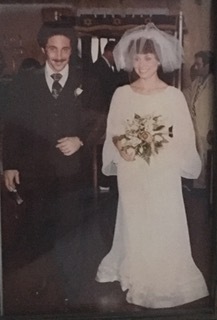
We had known each other since grade school. (The circled faces are your grandfather and me.)
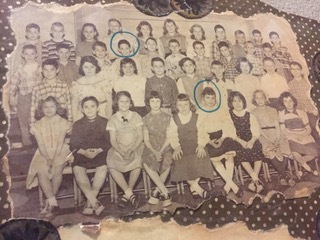
I’ve been writing a weekly column since Uncle Louie (Daddy to some) was three years-old.
I started a parenting magazine called Cincinnati Kids.
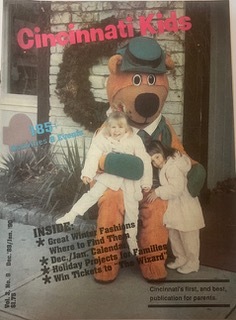
I was a host of my own weekly radio show for two years called “Sunday Night With Iris” and your grandfather introduced me each time I went on air.
I have written two books.
I am a motivational speaker.
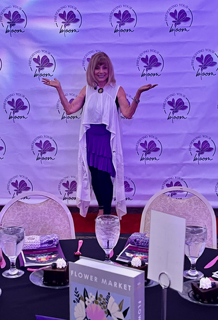
I am a creator of many hand-knitted items.
And I design and market vintage jean jackets.
Why am I laying out what I did with my life for you to read? Because I want you see that a personally handcrafted life based on following your own path is achievable. I did it and you can do it too.
Yes, at times it is exhausting.
Yes, at times it is overwhelming.
Yes, at times it is very discouraging.
Has it been worth it? Absolutely!
Have l leaned perseverance even when things are difficult and take a long time? Yes!
And what did I learn from the most? My successes or my failures?
Definitely my failures. I learned different ways not to do something which helped me figure out how to do something.
The famous poet Mary Oliver asks a very important question in her poem “The Summer Day.” I’d like to conclude with asking each of you that same question:
Tell me, what is it you plan to do with your one wild and precious life?”
You’ve got lots of time to figure it out, but please don’t waste it. Go for the gusto. You will never be sorry.
And know that your loving, crazy, eclectic family will always be there to be “the wind beneath your sails”.
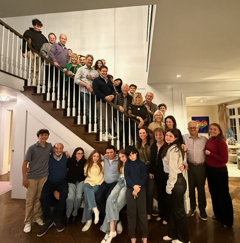
I love you all,
Nana
Keep Preserving Your Bloom,

December 13, 2024
A Keepsake for my Grandkids
I love when experts urge us to give voice to sharing our past struggles and challenges with our grandkids so they will know that difficulties are surmountable.
I find this hard. When we are together, we are all on our phones too much – or heedlessly running from one planned activity to the next – often embroiled in our own reality.
In an effort to afford my grandkids the opportunity to know my truth – to read of my journey – I decided to compose a booklet for each of my eight grandkids as a holiday gift and keepsake – hoping it would introduce them to my struggles, my triumphs and the wisdom I have gained in the last 77 years.
Here is an excerpt:
Dear Sophie, Benjy, Charlie, Bobbie, Lucy, Levi, Remi and Zoe,
Did you ever think about trying something new? Something that scared the heck out of you?
I did and I want to share that experience with you.
Years ago, when we hit hard financial times, I went to work to supplement our income. I chose to sell insurance, AFLAC, to be precise. After passing the test to become certified to sell insurance, I then had to learn the products. I also had to figure out how to find the right person in each company to pitch to and then convince them to let me present Aflac benefits to their workers. The next step was learning how to make presentations to the employees and learning how to use a computer to sign them up for the benefits. (Remember, this was 24 years ago.)
I absolutely hated it so much. Suddenly I was making friends and connections, not because of the joy of it – but to sell friends and their connections a product.
So what happened? I buckled down because I had to. I studied how the top salespeople overcame objections and were able to get into businesses to pitch ALFAC products. I then, with a pit in my tummy and a heart beating wildly, approached a fairly new friend who was CFO of a huge paper making company. I was still at the point that I didn’t quite understand thoroughly the products I was selling – which added to my stressed-out mindset.
My friend actually got the permission needed for me and a team of AFLAC agents to enter the factory, hold meetings with the employees and educate them on the benefits of AFLAC products.
My team and I sold so much insurance to this one company in three days that I became AFLAC Rookie of the Year for the State of Ohio. It was a big deal. It meant I sold the most insurance of any new AFLAC agent in Ohio for that time period.
But I still hated it.
So what did I do? I begged my district manager to convince the big guys in Columbus, Georgia (where AFLAC had their headquarters) that my highest and best use was to travel around the country teaching other AFLAC insurance agents how to cold call and sell. (Unbeknownst to me at the time, this was actually the start of what would be a very long and lasting motivational speaking career for me.)
I didn’t hate it as much after that. But, when out of the blue, I was offered a dream position as the editor of the Jewish newspaper in Cincinnati, I grabbed it.
What had I learned? Selling was the hardest experience of my life.
What stayed with me long after I stopped working for AFLAC, though, was the self-confidence and empowerment I gained from doing something so challenging and doing it well.
That experience literally gave me proof that I could do anything I put my mind to. And that feeling has never left me – even when the going gets tough. (And in our family, my dear grandkids, when the going gets tough, we get going.)
There’s not a wimp among us.
Keep Preserving Your Bloom,




